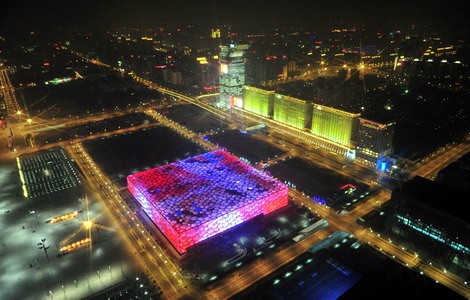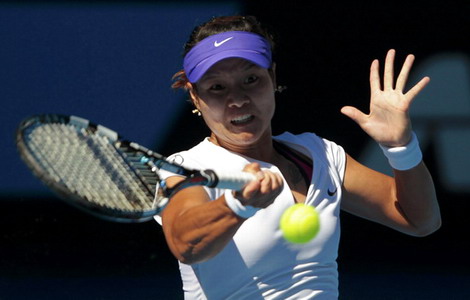Year of Dragon: Long may the long reign in China
Updated: 2012-01-23 10:12
(Xinhua)
|
|||||||||||
More Than Economic Concerns
On the eve of the Spring Festival, President Hu Jintao visited grassroots urban and rural areas in Beijing, extending greetings to the people.
Hu went to the small village Tianxianyu near the Great Wall in Beijing's northern mountainous area, where he joined villagers asking about their livelihood and watching a dragon dance to welcome the New Year.
In a similar action that is regarded as the central authorities' concern for the people, Premier Wen went to an oilfield in northwestern Gansu Province on Saturday.
Festivity also surrounded Wukan, a village in the southern province of Guangdong which came into international spotlight for protests that lasted more than three months against illegal land requisition and corruptions in village financing and elections.
The turbulence since September receded at the end of last year after a senior provincial official vowed, in a rare high-profile dialogue with protesters, to address the villagers' complaints and launch a probe.
Zhu Mingguo, vice secretary of the Guangdong Provincial Committee of the Communist Party of China, said that most of the villagers' appeals and complaints were reasonable.
Provincial investigators later announced that there were violations in the village's land requisition and the village committee election in February 2011 was invalid.
Now people in Wukan said their New Year wish is a smooth village committee election slated after the Spring Festival holidays.
"We hope the new committee can solve the land problems soon and completely," said a villager, Zhang Yi.
Wukan has been taken as an example about how the government should respond to the public's concerns and outcries as some places in the country are troubled by protests over land requisitions, pollution concerns and other problems amid rapid urbanization and industrialization.
Actually, social stability has been on the government's top agenda as it endeavors to let all the people share the fruit of the country's economic development.
At a provincial legislators' session earlier this month, Wang Yang, Guangdong's Party chief, warned that the biggest challenge faced by Guangdong is not economic but social problems.
Premier Wen also underscored the improvement of people's livelihoods, democracy, equity and justice in his speech at Saturday's gathering.
Year of World
UN Secretary-General Ban Ki-moon has delivered a video message wishing the Chinese people Happy New Year.
He said the New Year is a season of renewal and the Year of the Dragon "reminds us of our dynamism, our energy, our power to make a difference."
Some foreigners are expecting the Chinese dragon to bring them fortune.
Martin Judge, founder of a human resources service company based in Philadelphia, the United States, said his company has decided to expand business to two more Chinese cities in the Year of the Dragon following Beijing and Shanghai.
The financial crisis came as a blow to the company's ambition of taking 1 billion U.S. dollars by 2016, according to Judge.
However, China has become the company's fastest-growing market since it entered the country three years ago, which Judge expects to surpass North America to become its biggest market in the world.
The company expects to launch 10 offices in the Chinese mainland by 2015.
Judge said that he believes the world can share the dynamism, auspice and festivity that the Year of the Dragon brings to China.
Auspice or Threat
However, not everyone takes the dragon as such a lovely symbol as China's want-to-be parents, at least not with its traditional appearance.
A set of stamps marking the Year of the Dragon unveiled earlier this month renewed a debate on the image of the emblem of China, which in the west is interpreted by some people as a token of "China's threat."
The "roaring" dragons featuring their traditional look in the stamps were considered "too ferocious" and "intimidating" in the eyes of some critics.
And there have been suggestions that the dragon should have a new look in the modern era, such as a lovely cartoon image that has been adopted by toy designers for the mascot of the Year of the Dragon.
A legendary creature, the dragon, or "long" in Chinese pinyin, has been regarded as one of the four auspicious animals in the Chinese culture. The other three are the phoenix, tortoise, and kylin.
The dragon is a combination of the features of various animals that people are familiar with.
A dragon has a protruding forehead indicating wisdom and antlers signifying longevity. Its ox's ears denote success in the imperial examination; it has tiger's eyes as a sign of power; eagle's claws showing bravery; while a fish's tail implies flexibility and the horse's teeth are a mark of diligence.
Chinese people have a long held belief that they are descendants of the dragon, but the tradition once firmly embedded in their culture now faces a challenge with the emergence of the "China threat" prophesy in the West and loud calls and suggestions within the country to change the dragon's image, or even take another animal as the country's totem.
For anthropologist Tian Zhaoyuan, however, the dragon has become an unshakable national connection among the Chinese people worldwide and a representative cultural image of the nation.
"It represents beauty, diligence, dynamism, fortune and is auspicious, and all these definitions can be supported by Chinese fairy tales about the creature," said Tian, a professor with the Shanghai-based East China Normal University.
"It also depends on how people interpret its image," said Tian. "Why not take its opening mouth as a sign of big laugh, and stretching claws as a pose of dancing?"
The professor's comments are echoed by Lew Baxter, a British author, publisher and long-time China observer.
He said he has noticed the debate about the dragon's image as a Chinese totem, but "it seems a step too far into fantasy to think that it might harm China's reputation."
"Now some might regard China as a threat but in economic and cultural terms the 'awakening dragon' of China in the 21st century should be regarded in a positive light, it is bringing good fortune to the world."
"The best way, I believe, that China can approach this is to regard the dragon as an asset, an emblem to be proud of, just like the Welsh people view their dragon," said the man who spent the 1990s in China and now mainly works on publication projects focused on China.
In his homeland Wales, the red dragon became a regular feature on the banners of the nation's armies and was recognized as the national emblem in the 12th century.
Today, the Welsh flag featuring the Red Dragon, which does look like a fierce beast, is flown all over Wales, and is regarded with pride and deep affection, Baxter said.
Severiano Gomez, who is from the United States and now works as a consultant at a British-invested property management company in Shanghai, said that he has found, after years of learning the Chinese language, that the dragon in Chinese culture is a creature that means festivity.
"I hope I can have good luck in the Year of the Dragon, and make more money," he said.
Hot Topics
Kim Jong-il, Mengniu, train crash probe, Vaclav Havel, New Year, coast guard death, Internet security, Mekong River, Strait of Hormuz, economic work conference
Editor's Picks

|

|

|

|

|

|







